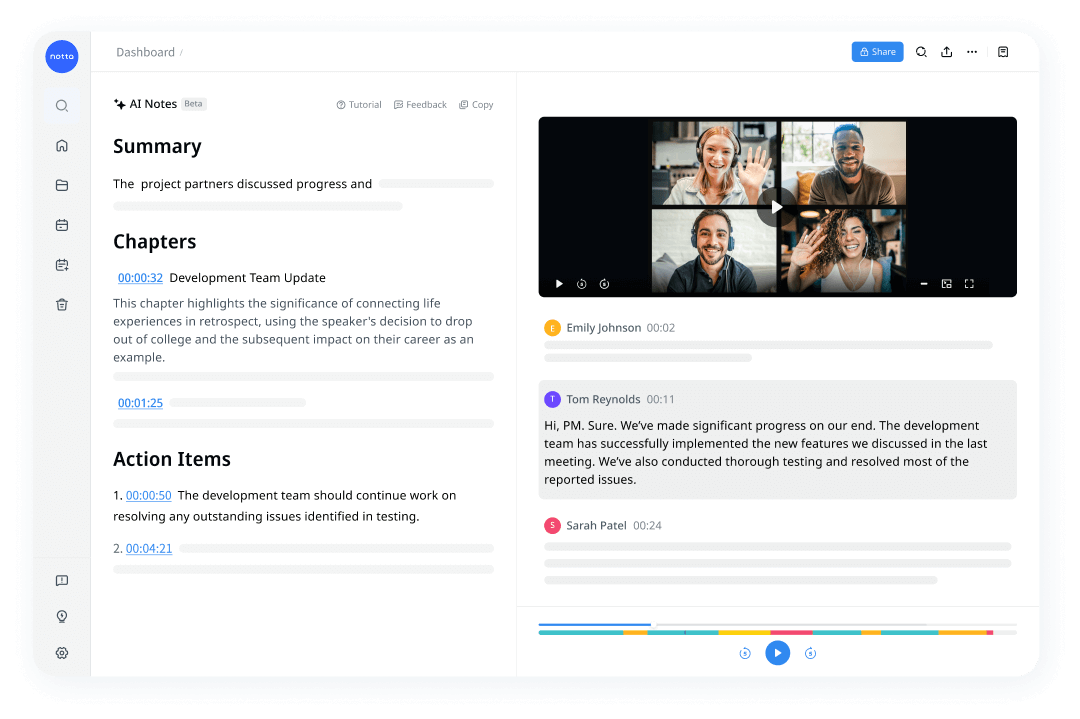
20 Effective Sales Discovery Questions to Use in 2025
Record, transcribe and summarize conversations with one click.
Closing clients and customers is a rewarding experience, but it won't be fruitful if you don't understand their pain points and concerns, which I’m sure you already know. The key to closing a sale is to ask the right and most impactful questions that can get you a step closer to your goal.
I have been in sales for several years and can tell you that the right sales discovery questions are paramount. If you’re wondering which are the most impactful sales discovery questions to ask, then I’m here to help. In this guide, I explain 20 of the most important discovery call questions you can ask your prospects to stand the best chance of getting a step closer to closing a sale.
What are discovery questions in sales?
Discovery questions are those you ask your prospects to determine whether or not they’re a good fit for your products and services. They’re the first step in the sales process, right after the prospect agrees to meet with you. These help you gauge their pain points, goals, and fears so you can tailor your sales demo to address these concerns and increase your chances of closing a sale.
Discover questions to ask during your sales call
Since discovery calls are critical to understanding whether or not you can win a particular prospect’s business, it becomes critical that you ask them the right and the most impactful questions. These help gauge whether you should carry them forward to the next sales process step. Here are 20 key questions you should ask your prospects to gather every possible insight.
Open-ended questions that kick things off
The first set of questions you ask your prospects should ideally be open-ended rather than pointed. These are the best ways to identify finer details that may be left out otherwise. They help set the stage for you to understand your prospect’s organization, its challenges, and
opportunities for you to promote your product or service. Some of these include:
Tell me about your company.
This is the simplest but also amongst the most important questions as it allows the prospect to tell you about their organization in their own words. However, you must be careful not to ask this question right away but to follow it up with a few key insights you’ve gained about it, as this makes you seem well-prepared.
What does your role involve on a daily basis?
While this is more about the individual and less about the organization, it can be a great way to break the ice, particularly since most prospects look forward to describing their roles and responsibilities.
What is your work environment like?
Understanding your prospect’s work environment can be a great way to gauge how they tackle challenges and deal with processes. It also helps you understand the chain of command and the key decision-makers.
What metrics are you responsible for?
There might be situations in which the prospect is not entirely forthcoming about their responsibilities. This is where it helps to ask them about specific metrics for success, as it also gives you a blueprint of how you can sell your product or service to improve the metric in question.
What is your current process for dealing with [process or pain point]?
Asking the prospect about how they handle certain processes can give you a good idea about whether or not your product or service will truly be able to improve their workflow and benefit them in the long run. This is among the most crucial fact-finding questions you can ask at the early stages.
Get Notta AI to summarise meetings and next steps, schedule meetings, and put you in the best position to secure business.
Discovery questions for identifying pain points
Once you’ve set the foundation with a few key open-ended questions, you must then move on to the key details: identifying their pain points and challenges. These are key to helping you understand whether or not your offering can truly make a quantifiable improvement in their workflow. Here are a few key questions you can ask.
What made you want to explore our solution?
This is one of the best ways of indirectly asking your prospects which part of your solution they’re interested in. For example, if your solution is a visual development platform and your prospect tells you they’re interested in some of the integrations your platform offers, you can decipher a lack of integration in their current tech stack as a potential pain point.
How are you currently managing [specific challenge]?
This can be a great follow-up to the previous question if your prospect highlights a specific challenge as the reason for their interest in your solution. Asking how they manage it can give you an understanding of the gaps and challenges in their approach as they explain their process step-by-step.
What opportunities have you missed out on due to [specific challenge]?
If the answer to this question aligns with one of your product or service's USPs, you have a specific feature or benefit that you can advertise when you pitch your service as the solution to their challenges.
How much is [specific challenge] affecting your revenue?
Once you’ve understood the opportunities that they’ve missed out on as a result of a specific challenge, asking them how much those missed opportunities have cost them in monetary terms can be a great point to add to your pitch. Further, when you can convince your prospects that your solution can increase their revenue by a specific percentage, you’re more likely to successfully move the prospect to the next stage in the sales pipeline.
What features would you consider essential in a solution when addressing these challenges?
When prospects answer this question, they directly tell you their functional requirements and needs in clear terms. This question can help you understand if they’re the right fit for your solution and how you can tailor your pitch if they are.
Disqualifying questions to save your time
Just as it's important to ask questions that qualify a prospect as a potential customer, it’s just as important to know if you need to disqualify them. Here are a few discovery question examples you can ask that can save you time if they’re not the right fit for your solution.
What are your primary roadblocks to implementing this x or making a change?
While the questions earlier might give you some idea about any roadblocks the prospect and their organization might face in adopting your solution, it can sometimes be a good idea to ask them this directly so you get a clear answer. This can be a good way to figure out if they qualify or not.
What kind of timeline are you looking at to implement a change?
If the organization’s timeline and yours don’t align, you can automatically disqualify them because, in some cases, the prospect may be looking at a much longer timeline than you might have anticipated.
What’s your budget for finding a solution to this problem?
This is another direct but crucial question, as it clarifies how many resources they can allocate to your solution and the overall sales engagement. If their answer doesn’t align with what you’re offering, you can disqualify them.
How will this investment be funded?
This is a question that might be too probing in some cases where you and the prospect have not reached a certain degree of comfort yet, or they simply may not know the answer. However, if they do answer it, you get a good idea of where the funding for your product will come from.
Is the owner of the budget an executive sponsor?
An executive sponsor is usually a senior-level employee who’s committed to the success of a project because of their direct involvement in it. Knowing whether the budget owner is a single executive or an entire department is crucial.
Want the convenience of automated note-taking and AI summaries? Try Notta for your upcoming meetings.
Follow-up questions that establish the next steps
Once you’ve gathered all the key details that qualify a prospect to move them along the sales pipeline, you should ask them direct questions that can facilitate this process. Some of these questions are listed below for your reference.
Who else will be involved in making this decision?
Understanding which members of the organization will be involved in the decision-making process can give you an insight into how to approach them and who to involve. It can also help you understand if the prospect you're interacting with is a gatekeeper, an influencer, or a key decision-maker.
What does your decision-making process look like? Do you have a fixed set of criteria when choosing a vendor?
This question will be critical in understanding what boxes you’ll need to tick when pitching your solution to your prospect. While smaller firms may not have a set of criteria in writing, a larger enterprise most likely will.
Have you purchased a similar product or solution before?
Knowing whether or not the prospect has purchased a similar solution before and the answer to their challenges will give you a clear idea of how you can gain a competitive advantage. It can thus help you strengthen the case for your product or service.
Who should we invite to the demo?
Knowing who to invite to the demo confirms the list of key decision-makers. It also ensures that you don’t have to offer it a second time simply because one or more of the key stakeholders wasn’t involved in the process from the start.
Can I follow up with you on mm/dd?
Once you’ve gathered all the key information, you should strategically nudge your prospect to commit to following up on the process. This follow-up could clarify key details about your solution if there are still any gray areas, or it could move the prospect forward to the next step of the sales process.
All the questions mentioned above can help you get a clear picture of your prospects, their challenges, and whether or not they’re the right fit for your product. They will be essential when you’re looking at sales meeting ideas and discussing the agenda for your sales team.
Dos and don’ts during your discovery call
While asking the right sales discovery questions during your discovery call, there are certain things you should be mindful about doing and not doing in the process. Below is a list of things you should keep in mind.
Do:
Your research about the company includes its size, annual revenue, product offerings, etc.
Listen more than you talk. The key is to gather as much information from the prospect as possible.
Set a clear agenda for the meeting and record it so you can revisit key information while you prepare for the next steps.
Don’t:
Ask generic questions during the call. The key purpose of a sales discovery call is to obtain as much specific information as possible about the company and the industry as a whole.
Make assumptions about the prospect's needs or wants. Instead, ask them certain open-ended questions so you can hear what they have to say.
Ace your discovery calls with the right questions
The sales discovery process is crucial to gathering all the information you need about a prospect and their company. The key to making it successful is to ask the right sales discovery questions. Generic questions will get you generic answers, but in this guide, I’ve given you 20 questions you can ask for the most impact.
When conducting sales discovery calls, it’s always a good idea to record them so you have a transcript and a summary of everything discussed. An AI notetaker like Notta can be a great option for automatically recording, transcribing, and summarizing your sales discovery calls.
